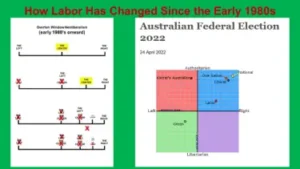Description
Explore the impact in Australia of neoliberalism in politics on the political landscape and the merging of major parties. Learn how diversity in politics can bring change.
Introduction: The Impact of Neoliberalism in Politics on Australian Political Parties
In Australia, the political landscape has undergone a transformative shift over recent decades, with neoliberalism exerting a profound influence on the major political parties. Both the Labor Party and the Liberal National Party have increasingly adopted market-driven ideologies, emphasizing the importance of free markets, deregulation, and privatisation of public assets.
This alignment toward neoliberal policies reflects a departure from traditional party platforms, with Labor moving away from its roots in worker advocacy and social welfare and the Coalition doubling down on corporate interests and fiscal conservatism.
This ideological convergence has blurred the distinctions between the two major parties, creating a political environment where voters often feel that neither party offers a genuine alternative to neoliberal economic principles.
Key sectors, such as education, healthcare, and housing, have been significantly affected, with reduced public funding and greater reliance on private investment leading to growing inequality and declining access to essential services. Moreover, this policy uniformity raises critical questions about the effectiveness of a two-party system in addressing pressing societal challenges, including climate change, affordable housing, and income inequality.
By prioritizing market efficiency over social and environmental well-being, both parties risk alienating voters and neglecting broader public needs.
Understanding Neoliberalism in Politics
Adoption of Neoliberal Policies by Major Parties

Over the last few decades, Australia’s major political parties have shifted towards policies that strongly favour economic liberalism. This includes extensive privatization of public assets, deregulation of industries, reduction in public spending, and a focus on free-market mechanisms to address national economic issues. This alignment with neoliberal principles has been influenced by global economic pressures, the increasing power of multinational corporations, and the perceived need to remain competitive in a globalized economy.
Factors Influencing Neoliberal Adoption
The adoption of neoliberalism in politics by these parties is driven by several factors:
– Globalization: As global markets become more integrated, there is a push towards adopting economic policies that favour an open economy, competitive tax regimes, and reduced trade barriers.
– Economic Crises: Responses to financial crises often involve austerity measures and restructuring economies based on neoliberal advice provided by international organizations like the RBA, IMF and the World Bank.
– Political Strategy: Neoliberal policies are often seen as pro-business and supporting them can attract campaign donations and support from powerful economic entities.
Impact on Society and Environment
Consequences for Social Equity
The rise of neoliberalism in politics has fundamentally altered the role of the state in providing welfare and social services, with devastating consequences for social equity.
By reducing public investment and emphasizing market-driven solutions, the government has shifted many responsibilities to private entities, often prioritizing profit over public good.
Essential services such as healthcare, education, and housing have become increasingly commodified, creating barriers for low-income individuals and families who struggle to afford them.
This shift has entrenched systemic inequality, with wealth and opportunities concentrating among the affluent, leaving marginalized communities further behind.
The privatisation of public assets, such as utilities, transportation, and even aged care facilities, has not only made these services more expensive but also less accountable to public needs.
The reduced availability of affordable housing has worsened homelessness and financial stress among renters and first-time buyers, illustrating the stark divide between socio-economic classes.
By dismantling safety nets and promoting a “user pays” philosophy, neoliberal policies have entrenched disadvantage and reduced the state’s ability to mitigate poverty and inequality effectively.
Environmental Concerns
Neoliberalism in politics emphasis on economic growth and deregulation has also undermined environmental sustainability. Short-term profits have often been placed above long-term ecological health, resulting in widespread degradation of Australia’s unique ecosystems.
Key industries such as mining and fossil fuels have been allowed to expand with minimal oversight, leading to deforestation, habitat destruction, and significant contributions to greenhouse gas emissions.
These practices jeopardize biodiversity and Australia’s commitments to addressing climate change, further diminishing the country’s global environmental standing.At the same time, the prioritization of corporate interests has stifled investment in renewable energy technologies and sustainable infrastructure.
Despite Australia’s abundant natural resources for solar and wind energy, policy settings have failed to fully capitalize on these opportunities, leaving the country lagging global trends in clean energy adoption.
Deregulated environmental protections have made it easier for corporations to sidestep sustainability measures, eroding the ability to address critical challenges such as water scarcity, rising temperatures, and extreme weather events.
By sidelining environmental concerns in favour of profit-driven initiatives, neoliberalism has not only compromised the natural environment but also the health and well-being of future generations.
Political Homogeneity and Its Implications
Voter Perception of Political Choices
The ideological convergence of the major parties on neoliberal lines has blurred the distinctions between them, leading to voter disenchantment. Many citizens feel that regardless of which party they vote for, the outcome will favour market mechanisms over social or environmental considerations.
Challenges to Democratic Engagement
The convergence of major political parties toward neoliberaliam in politics has created a perceived lack of meaningful choice for voters, undermining the vibrancy of Australia’s democratic system. When both the Labor Party and the Liberal National Party advocate similar economic principles—emphasizing market-driven solutions over social investment—voters often feel alienated, as their diverse priorities and values are not adequately reflected in the policy platforms of either party.
This disillusionment can result in lower voter engagement, diminished political activism, and declining turnout at elections, eroding the legitimacy of democratic processes.
A disengaged electorate creates a vacuum in which governance becomes less representative of the broader population. Decisions tend to favour powerful interest groups, such as corporations and political donors, while sidelining the needs of ordinary citizens, particularly those from marginalized communities.
The lack of diverse voices in policymaking fosters cynicism about whether the political system is truly designed to serve the public good or merely perpetuates the status quo of inequality and corporate dominance. Additionally, voter apathy and reduced participation may lead to the entrenchment of political elites, further consolidating power within a narrow band of interests.
This dynamic can stifle innovation and reform, making it harder for grassroots movements, independent candidates, or smaller parties to challenge the dominance of the two-party system. In this context, democratic engagement becomes less about active participation and more about passive acceptance, weakening the foundations of a healthy and inclusive democracy.
Breaking the Two-Party System
Advantages of a Multi-Party System
Expanding beyond the limitations of Australia’s two-party system could unlock significant benefits for democratic governance, fostering a more inclusive and representative political landscape. A multi-party system offers the opportunity to introduce a broader spectrum of ideas and policy solutions, challenging the dominance of neoliberalism in politics and its economic frameworks that prioritize market efficiency over social welfare and environmental sustainability. By giving voters a wider array of options, a multi-party system can better reflect the diverse values, priorities, and needs of Australia’s electorate.
Such a system encourages the emergence of smaller parties and independents with specific focus areas, such as climate action, Indigenous rights, affordable housing, or workers’ protections. These parties can act as catalysts for change, advocating innovative policies and addressing neglected issues.
For example, Green parties or progressive independents might push for renewable energy investments and stronger environmental regulations, while social justice-oriented parties could champion universal healthcare, free education, and measures to reduce income inequality.
Moreover, a multi-party system can reduce the concentration of power within two dominant entities, increasing accountability and transparency in governance. Coalition-building becomes a necessity, forcing parties to collaborate and compromise, which can lead to more balanced and well-rounded policymaking. This system also disrupts entrenched political alliances with corporate donors, as smaller parties are less likely to rely on large-scale funding and more likely to engage directly with grassroots movements.
Adopting a multi-party system could reinvigorate democratic engagement, as voters feel their voices are more accurately represented in a parliament with diverse viewpoints. It could also reduce voter disillusionment by showing that meaningful change is possible when governance reflects a wider array of societal perspectives and priorities. Ultimately, breaking the two-party monopoly could pave the way for a fairer, sustainable, and inclusive future for Australian democracy.
Strategies for Encouraging Political Diversity
Encouraging a multi-party system involves several strategic changes:
– Electoral Reforms: Adopting proportional representation to give smaller parties a better chance at representation.
– Public Funding of Campaigns: Reducing the influence of corporate donations in politics by providing public funding for campaigns.
– Civic Education: Enhancing the public’s understanding of political issues and the impact of their vote through comprehensive civic education programs.
Conclusion: Towards a More Diverse Political Landscape
The growing homogeneity in Australian politics calls for a re-evaluation of our political and economic systems. Encouraging diversity in political representation can lead to more robust discussions and policies that reflect the complex needs of Australia’s society and environment.
Question for Readers
How can Australians foster a more diverse and representative political landscape to address social and environmental challenges effectively?
Call to Action
Take part in the political process, support diverse voices and policies, and engage in community discussions to ensure a vibrant and representative democracy.
Share This Article
Please share this article with your contacts and on social media to encourage a more informed and engaged electorate in Australia.
References:
How Labour made neoliberalism: https://opus.lib.uts.edu.au/rest/bitstreams/7face9ba-c115-49db-a27c-df77755a1399/retrieve
Reviewing the relationship between neoliberal societies and nature: https://www.ncbi.nlm.nih.gov/pmc/articles/PMC7613825/
How to fix democracy: Move beyond the two-party system, experts say: https://www.washingtonpost.com/business/2021/03/01/break-up-two-party-system/
Is this the end of the two-party system in Australia?: https://theconversation.com/is-this-the-end-of-the-two-party-system-in-australia-the-greens-teals-and-others-shock-the-major-parties-182672
Australian Labor led centre-left parties into neoliberalism. Can they lead it out?: https://www.theguardian.com/commentisfree/2017/apr/06/australian-labor-led-centre-left-parties-into-neoliberalism-can-they-lead-it-out
Neoliberalism has coned us into fighting climate change as individuals: https://www.theguardian.com/environment/true-north/2017/jul/17/neoliberalism-has-conned-us-into-fighting-climate-change-as-individuals
Two-party system: https://en.wikipedia.org/wiki/Two-party_system

